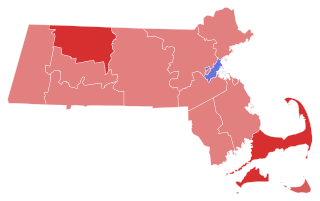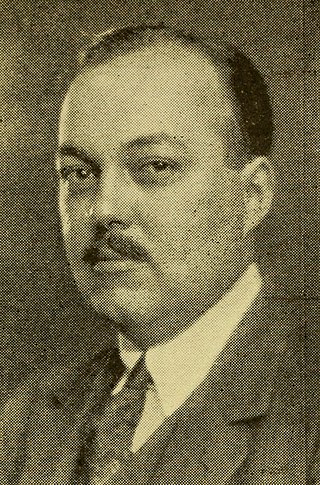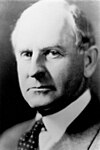
Frederick Huntington Gillett was an American politician who served as the 42nd Speaker of the United States House of Representatives from 1921 to 1925 and as a U.S. Senator from Massachusetts from 1925 to 1931. A Republican, Gillett first began his career in politics when he served in the Massachusetts House of Representatives from 1890 to 1891, and would go on to serve in the House from 1893 to 1925. In 1924, he became the oldest individual elected to a first term in the U.S. Senate, a record that he would hold until Peter Welch's victory in the 2022 United States Senate election in Vermont 98 years later.

The 1928 Republican National Convention was held at Convention Hall in Kansas City, Missouri, from June 12 to June 15, 1928.

Marcus Allen Coolidge was a Democratic United States Senator representing Massachusetts from March 4, 1931, to January 3, 1937.
The Massachusetts Republican Party (MassGOP) is the Massachusetts branch of the U.S. Republican Party.

Alvan Tufts Fuller was an American businessman, politician, art collector, and philanthropist from Massachusetts. He opened one of the first automobile dealerships in Massachusetts, which in 1920 was recognized as "the world's most successful auto dealership", and made him one of the state's wealthiest men. Politically a Progressive Republican, he was elected a member of the Massachusetts House of Representatives, was a delegate to the Republican National Convention in 1916, and served as a United States representative from 1917 to 1921.

The 1936 United States Senate election in Massachusetts was held on November 3. Incumbent Democratic Senator Marcus A. Coolidge declined to stand for re-election. Republican Henry Cabot Lodge Jr. won the race to succeed him over Democratic Boston mayor James Michael Curley and former Suffolk County prosecutor Thomas C. O'Brien.

The 1928 United States Senate election in Massachusetts was held on November 6, 1928, with Democratic incumbent David I. Walsh defeating his challengers.

The 1926 United States Senate special election in Massachusetts was held on November 2, 1926.

The United States Senate election of 1948 in Massachusetts was held on November 2, 1948, with Republican incumbent Leverett Saltonstall defeating his challengers.

The 1944 United States Senate special election in Massachusetts was held on November 7, 1944. Republican Governor Leverett Saltonstall was elected to finish the term of Henry Cabot Lodge Jr., who had resigned from the Senate to serve in World War II.

The United States Senate election of 1924 in Massachusetts was held on November 4, 1924. Incumbent Democratic Senator David I. Walsh, first elected in 1918, ran for a second term in office but was defeated by the Republican nominee incumbent Speaker of the U.S. House Frederick H. Gillett. Despite winning 13 out of 14 counties in the state, Gillett was only able to win a narrow margin of 1.7%, which was largely due to Walsh's strong performance in Suffolk County, home to the state capitol of Boston, likely being carried over by fellow Republican Calvin Coolidge's strong performance in the 1924 United States presidential election.

Eben Sumner Draper was an American businessman and politician who served in the Massachusetts General Court, was president of the Milford National Bank & Trust, and was the last member of his family to serve on the board of directors of the Draper Corporation. He was the son of Massachusetts Governor Eben Sumner Draper.
The 1946 Massachusetts general election was held on November 5, 1946, throughout Massachusetts. Primary elections took place on June 18.

The 1930 Massachusetts gubernatorial election was held on November 4, 1930.

Robert Morris Washburn (1868–1946) was an American politician and writer who served in the Massachusetts General Court and wrote a newspaper column and a number of biographies on Massachusetts politicians, including Calvin Coolidge.

The 1922 Massachusetts gubernatorial election was held on November 7, 1922.

The 1924 Massachusetts gubernatorial election was held on November 4, 1924.

The 1926 Massachusetts gubernatorial election was held on November 2, 1926.

The 1934 Massachusetts gubernatorial election was held on November 6, 1934.

The 1909 Massachusetts gubernatorial election was held on November 2, 1909. Incumbent Governor Republican Eben S. Draper was re-elected, defeating Democratic nominee James H. Vahey with 48.64% of the vote.






















